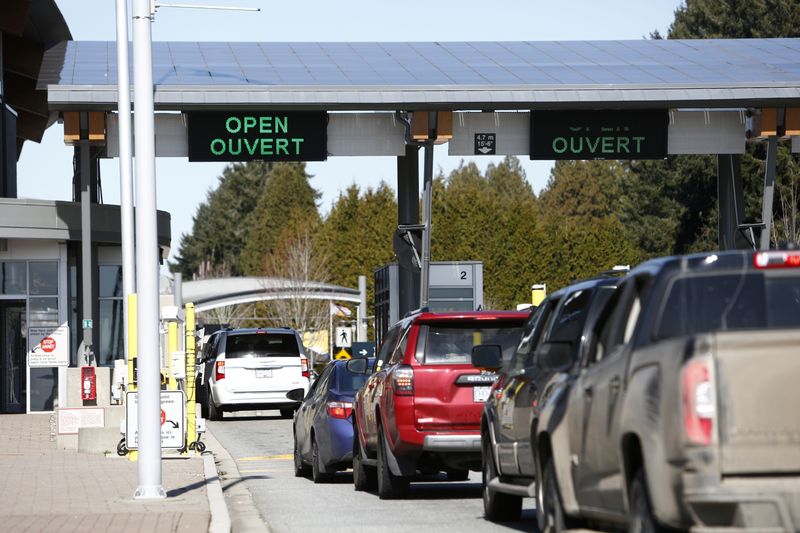This post was originally published on this site
https://i-invdn-com.akamaized.net/trkd-images/LYNXMPEG2H1GM_L.jpg © Reuters. FILE PHOTO: Drivers wait to cross through Canadian customs at the Canada-US border near the Peace Arch Provincial Park
© Reuters. FILE PHOTO: Drivers wait to cross through Canadian customs at the Canada-US border near the Peace Arch Provincial ParkBy Doina Chiacu and Susan Heavey
WASHINGTON (Reuters) – President Donald Trump said on Wednesday the United States would close its border with Canada to “non-essential traffic” and New York City moved nearer to ordering residents to stay at home as the country struggled to slow the spread of the coronavirus.
The glimmering casinos of Las Vegas, America’s gambling capital, were ordered to go dark starting on Wednesday as the disruption caused by the pandemic stretched into nearly every aspect of American life.
“This is only common sense,” said Nevada Governor Steve Sisolak in mandating the closure of all non-essential businesses, including the casinos that drive his state’s economy.
With cases of the respiratory illness caused by the virus reported in all 50 states and the total number of known U.S. infections surging past 6,400, millions of Americans stayed at home instead of commuting to work or going to school. The U.S. death toll has topped 100.
Many people have lost jobs with numerous businesses closing during the crisis even as President Donald Trump’s administration works with Congress to approve economic stimulus legislation.
“We will be, by mutual consent, temporarily closing our Northern Border with Canada to non-essential traffic. Trade will not be affected. Details to follow!” Trump wrote on Twitter.
Wall Street’s main indexes slumped at the open on Wednesday as growing signs of coronavirus damage to corporate America overshadowed optimism about sweeping official moves to protect the economy.
New York City Mayor Bill de Blasio said on Wednesday that he was “almost to the point” of recommending the most populous U.S. city adopt a “shelter-in-place” policy that would keep residents confined to their homes.
De Blasio, speaking on NBC’s “Today” show, said he planned to speak with Governor Andrew Cuomo about the matter later in the day. New York City had 923 confirmed coronavirus cases as of Tuesday evening. De Blasio said he expects the number of cases in his city to increase rapidly.
“We are going to top 1,000 today undoubtedly. We are going to be at 10,000 not so long from now,” the mayor said.
“We have a little bit more we have to make sense of – how we are going to get people food and medicine,” de Blasio said when asked how close he was to implementing the “shelter-in-place” policy in the city of more than 8 million people. “But I have to say it has to be considered seriously starting today.”
New York, Washington state and California are the states with the most cases of the virus.
U.S. health officials appealed to youth to “do their part” by heeding guidelines on self-isolation to blunt the coronavirus outbreak and warned that the White House may have to extend its action plan if 15 days proves insufficient.
‘FLATTEN THE CURVE’
“Fifteen days is likely not going to be enough to get us all the way through, but we really need to lean into it now so we can bend the curve in the 15 days, and at that point we’ll reassess,” U.S. Surgeon General Jerome Adams told NBC’s “Today” program.
“If we can get America to all pitch in for the next 15 days, we can flatten the curve … not overwhelm our healthcare system and hopefully get through this.”
The renewed warnings followed Tuesday’s announcement that Trump’s administration would seek a $1 trillion stimulus package, possibly to include $1,000 direct payments to individual Americans.
Even with vigilance, the healthcare system ran the risk of running out of devices such as ventilators and respirators, healthcare officials have said.
U.S. Vice President Mike Pence, who leads the administration response, repeated the call for 15 days of concerted action but said the effects would likely linger until midsummer.
“We fully expect that we will be dealing with the coronavirus in the United States for months,” Pence told National Public Radio in an interview that aired on Wednesday.
Trump, facing criticism for his handling of the crisis even as he seeks re-election on Nov. 3, promised that Americans would soon see money to help offset the economic pain of the seismic closures across the country. Congress has not yet finished work on a multibillion-dollar emergency bill, with any cash payments likely to be part of a subsequent package.
Trump defended his handling of the crisis, writing on Twitter he has “done a very good job from the beginning” and assailing media coverage. Critics have accused him of initially minimizing the threat, giving mixed messages and giving providing unreliable information on issues such as the availability of testing.
Trump said he would hold a news conference related to the Food and Drug Administration and the coronavirus but gave no details. The White House task force daily news conference was scheduled for 11:30 a.m. EDT (1630 GMT).
His administration late on Tuesday also asked Congress for another $45.8 billion to shore up federal agencies amid the outbreak, seeking extra money to help sanitize airports, get protective equipment to federal officers and shore up cyber defenses.
Meanwhile, health officials were responding to reports that younger people across the country were defying official guidelines about staying home and avoiding large gatherings, increasing the risk of spreading the virus.
Seema Verma, head of the U.S. Centers for Medicare and Medicaid Services, said people who do not show any symptoms could spread the virus to others who are more vulnerable, especially the elderly and those with underlying health conditions.
“It is incumbent on every single American to do their part, even that millennial generation,” Verma told CNBC.

